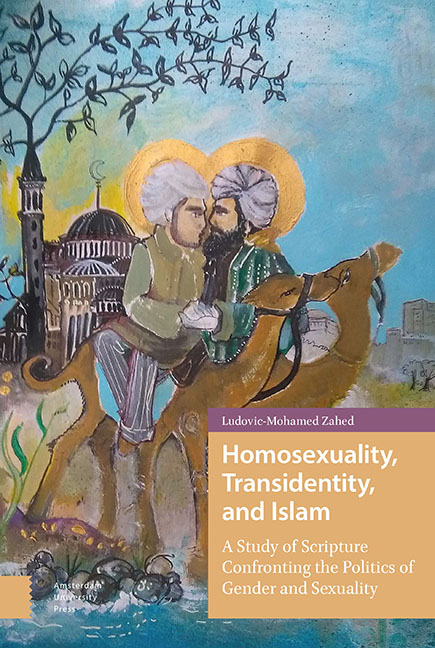 Homosexuality, Transidentity, and Islam
Homosexuality, Transidentity, and Islam Book contents
- Frontmatter
- Contents
- List of Figures
- Acknowledgments
- Foreword
- Introduction
- I The Qur’anic Ethics of “Nature”: Gender, Sexuality, and Diversity
- II Distressing Qur’anic Verses?
- III The Prophet: A Living Incarnation of Qur’anic Ethics
- IV Islamic Apocrypha Advocating the Stoning of “Sodomites”
- V Postcolonial Orientalisms
- VI “Abnormals”: From Cultural Diversity to Dogmatic Uniformity
- VII Towards a Structural Reevaluation of Cultural Values
- VIII Pan-Arabist Literary and Identity Censorship
- IX Orientalist Shi’ism and Literary Homoeroticism
- X Homonationalism and Performative Sexual Categorization
- XI A “Crisis” of Categories, Geopolitics or Civilization
- Conclusion
- Afterword
- Bibliography
- Index
VII - Towards a Structural Reevaluation of CulturalValues
Published online by Cambridge University Press: 20 November 2020
- Frontmatter
- Contents
- List of Figures
- Acknowledgments
- Foreword
- Introduction
- I The Qur’anic Ethics of “Nature”: Gender, Sexuality, and Diversity
- II Distressing Qur’anic Verses?
- III The Prophet: A Living Incarnation of Qur’anic Ethics
- IV Islamic Apocrypha Advocating the Stoning of “Sodomites”
- V Postcolonial Orientalisms
- VI “Abnormals”: From Cultural Diversity to Dogmatic Uniformity
- VII Towards a Structural Reevaluation of Cultural Values
- VIII Pan-Arabist Literary and Identity Censorship
- IX Orientalist Shi’ism and Literary Homoeroticism
- X Homonationalism and Performative Sexual Categorization
- XI A “Crisis” of Categories, Geopolitics or Civilization
- Conclusion
- Afterword
- Bibliography
- Index
Summary
Abstract
How can French queer Muslims recognize themselvesin identities which are alternative to the whiteheterosexual one? Do they betray a part of theheritage of their forefathers by embracing thosealternative identities? How to address thisproblematic – as well as the question of ethicalvalues – is intensively discussed within Frenchqueer Muslim circles.
Keywords: queer Muslim activism,restructuration, postmodernity
For over ten years now, queer French Muslims have beencaught between one extreme (virilist and pan-ArabistIslamism) and another (European nationalism). Theformer pretends that (gender) diversity and Islamare incompatible, while the latter adopts(neo)colonial strategies to assimilate diversecultures into a homogenous whole that conforms toparticular (all while pretending to be universal)social, political and identity norms. Thus, thequestion remains whether queer French Muslims canrecognize themselves within identities that arealternative to white heterosexuality. Would they bebetraying a part of their ancestors’ heritage byembracing those alternative identities?
There are historical antecedents to these sorts ofreflexive questions in Arab-Muslim history. Forinstance, Ghâlib (1797-1869), the last of the Mughalpoets, expressed himself very openly in 1861 on thequestion of same-sex relations and age differencesto his friend Ala Ud Din Ahmad Khan Alai (Kidwai,2001, p. 189). However, in another letter, Ghâlibreprimanded his friend who had left his wife toengage in pederastic relations with a member of thesame sex: “Is this any way to behave to leave yourwife for a boy?” Within the same philosophicaltradition, ‘Abd al-Ghani al-Nabulusi (1641-1731), afamous Sufi Sheikh born in Damascus, responded tothose who advocated the other extreme:
They disapprove of the contemplation of beautyand put on equal footing the wolf and the gazelle,repealing their difference. They would like toabolish in the eyes of humanity any shade betweenfreshness and oldness. And this by the weight oftheir personality and the deficiencies of theirmalevolent and diminished spirit. They think evilof others and, tomorrow, this will lead them totorment. (Al-Nabulusi, 2001, p. 36)
Ghâlib and other Muslim mystics were therefore aware ofthe delicate balance at the time between, on the onehand, male responsibilities towards the family andthe Muslim Mughal society and, on the other hand,the pursuit of homosexual relationships, outside theprivate circle and with a certain discretion, withina circle that could be described as “intimate.”
- Type
- Chapter
- Information
- Homosexuality, Transidentity, and IslamA Study of Scripture Confronting the Politics of Gender and Sexuality, pp. 65 - 74Publisher: Amsterdam University PressPrint publication year: 2019


